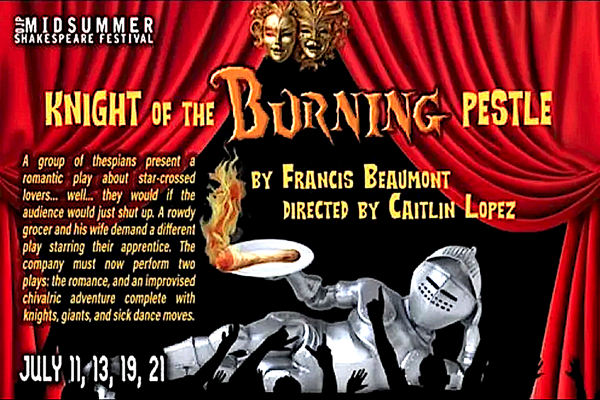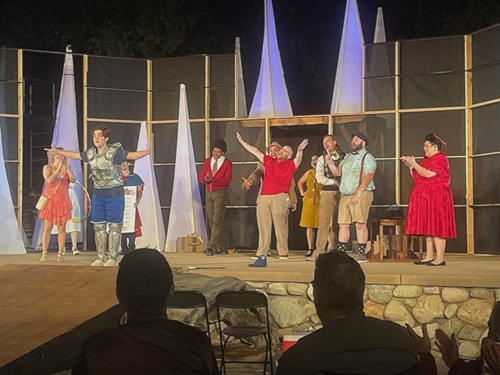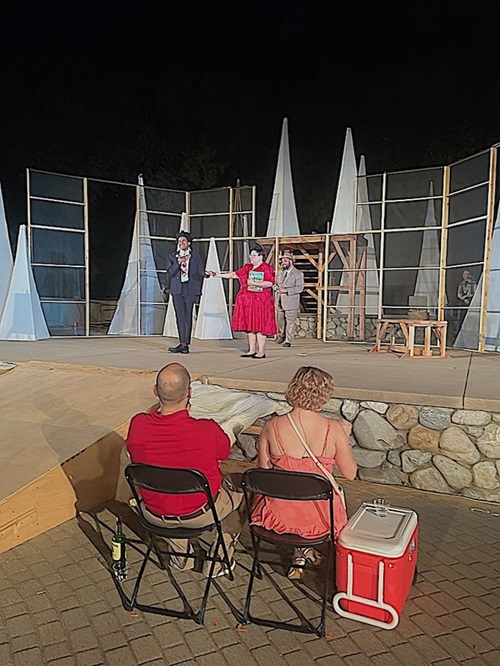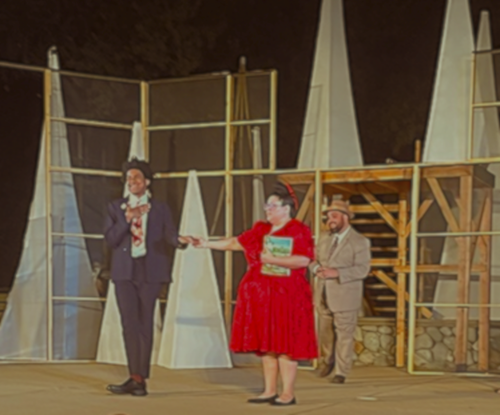
By Robert St. Martin
Claremont, California (The Hollywood Times) 07/19/2024
This past weekend was the opening of a new production of The Knight of the Burning Pestle, presented by Upland-based Ophelia’s Jump in repertory with La Tempestad (The Tempest) as part of its 10th Annual Midsummer Shakespeare Festival held in the Sontag Greek Theatre of Pomona College in Claremont.
This somewhat obscure play by Francis Beaumont, a collaborator with playwright John Fletcher, was originally written in 1607 and produced at London’s Blackfriar’s Theatre and was largely staged with child actors. The play is a satire on chivalric romances in general, similar to Don Quixote, and a parody of Thomas Heywood’s The Four Prentices of London and Thomas Dekker’s The Shoemaker’s Holiday – typical London city comedies of the time. In 1607, William Shakespeare was directing his grand tragedy Antony and Cleopatra at The Globe Theatre and had not moved towards his later comedic romances like The Tempest (1616).

This production by the theatre company Ophelia’s Jump Company, under the direction of Caitlin Lopez, is a hilarious rendering of Beaumont’s play that does justice to the satire on English middle-class values of Shakespeare’s time. What is most striking about this absurd, experimental play is how it breaks the fourth wall of theatre from its outset, years ahead of Pirandello and 20th century theatre. It anticipates a kind of British humor that did not reach popular acceptance until the 20th century with The Goon Show and Monty Python, with repeated use of meta-theatrical elements and breaking the fourth wall where the characters directly address the audience. It turns on the conceit that a well-to-do London grocer, his oversexed wife, and his apprentice Rafe can take over the stage in a rebellion against a play entitled “The London Merchant” supposed in rehearsal and acted by professional actors. They emerge from the audience and complain that the scripted play will misrepresent the middle-class citizens of the city.

The theatre director (played by actor Preston Grant) attempts to deal with the unruly Citizen Grocer (Alex Herrera) and his floosie Wife (Jenny Lockwood), as they insist the Grocer’s adolescent apprentice Race (Sam Erwin) be allowed to improvise a role as Knight Errant in search of adventures (a la Don Quixote). The theatre director gives in after Race launches in a crazy monologue about his chivalrous quest to save fair damsels from distress.

So we have a play within a play within a play: The Grocer and his wife call the shots and bribe the professional actors to change their production mid-stream and allow apprentice Rafe to act in his own play simultaneously. What is especially hilarious is how the Grocer and his inebriated Wife interfere with the stage rehearsal and even get up from their seats to argue with the actors on the stage. They assume that we in the audience are just like them – a typical London audience of the time who very much disliked wealthy merchants of the city.

Beaumont’s play is filled with stock characters, one being the rich merchant Venturewell, a miserly killjoy, who fires his apprentice Jasper (Corrin Icarus King), a poor and lowborn lad who dares to woo his overly-emotional daughter Luce (Alexandria Duarte) – much to the distress of Luce who is in love with him. Of course, Venturewell would prefer that his daughter be married to a gentleman of the city named Humphrey (brilliantly portrayed by Derek Smith), who seems too distracted and foppish to be a serious suitor of his daughter’s hand in marriage. Of course, Jasper promises Luce that she should elope and meet him in the woods to continue their romantic dalliance.

Cast out of work by his employer, Jasper returns home to his petit but shrewish mother Mistress Merrythought (Liana Rose Veratuedela) who dotes on her young spoiled son Michael (played by a large grown male actor, Austin Mooney). She, in turn, has no patience with her good-for-nothing husband Master Merrythought (a dual role for actor Derek Smith), a swivel-hipped, martini-swilling cool dude who is consumed in grooving to his ‘60s lounge music on his record player. Mistress Merrythought cannot deal with her older son Jasper losing his employment and she has no intention of supporting him.

The Grocer is only too happy to interrupt Venture well and his household, as well as putting up with Mistress Merrythought’s eventual flight when she decides to take her young son Michael and her box of jewels and leave her husband for good. Meanwhile and somewhat simultaneously the Grocer and his wife insist that his theatrically gifted apprentice, Rafe, should be on stage. Rafe’s dramatic vehicle is the fiction of a grocer-errant who pursues chivalric quests to assist damsels in distress and defeat monsters and giants. Rafe dons some theatrical armor and and, waving a large pestle in his hand, declares himself “The Knight of the Burning Pestle.” Every time Rafe enacts his extravagantly imaginative exploits, he interrupts the professional actors performing the originally scripted play, to the growing aggravation and annoyance of the actors trying to complete their performance.
About the pestle: It is a heavy tool with a rounded end, used for crushing and grinding spices and drugs in a mortar. The erstwhile knight chooses as his heraldic charge a “burning pestle,” intended as subtle joke to the audience suggesting a phallic symbol whose “burning” is open to interpretation, but likely would have been taken as a reference to venereal disease of “it hurts when I pee” sort. The knight thus embarks upon a series of misguided quests carrying his shield that effectively advertises “I am a giant prick.”
What makes the play especially entertaining is the updated cultural references in Caitlin Lopez’s script. Rafe claims to hail from Santa Clarita and references pop music and dance moves in his chivalric quest. He takes a knight’s vow to the “soul of Nicholas Cage.” The sound design by Lopez is a clever amalgamation of pop tunes fitted to the moment in the play. As Rafe, Sam Erwin captures the youthful exuberance of a teenager obsessed with medieval-style chivalric heroes. Jenny Lockwood is an absolute scream as the drunken, over-sexed Wife of the Grocer, continually fawning over every male she meets. But kudos to the superlative performance of Derek Smith in his dual role as Luce’s foppish suitor and Mistress Merrythought’s hard-partying husband. He really steals the show with his underplayed drollery.

All the silly pranks keep the theatre audience in stitches as they pull out the stops with their comic performances. As in Beaumont’s original play, the production is punctuated with music throughout. Ophelia’s Jump have updated topical references and musical choices to convey their significance. The Journey song “Don’t Stop Believin” brings home the ultimate spirit of Beaumont’s play, which is a celebration of theater, togetherness, entertainment, and the coexistence of different social tastes and fantasies. The improvisational feeling of this production makes The Knight of the Burning Pestle seem far ahead of its time – far more than just a comedy from the Jacobean period of English theatre and more like a rare precursor of 20th century Theatre of the Absurd. This production directed by Caitlin Lopez is definitely worth seeing – a true delight for a summer evening in a lovely outdoor setting at Pomona College’s Sontag Theatre.
The Knight of the Burning Pestle is part of Ophelia’s Jump Midsummer Shakespeare Festival at the Sontag Greek Theatre on the campus of Pomona College. It will be performed twice more, on Friday, July 19, and Sunday, July 21. Tickets are $40 for General Admission; $25 for College and High School Students with ID; and Children (10 and under) free with accompanying general admission adult ticket. For tickets and more information, go to: https://app.arts-people.com/index.php?actions=7&p=3